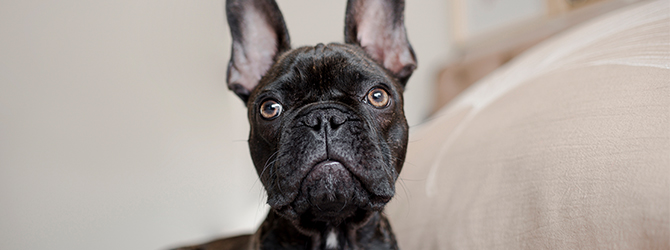Brachycephalic dogs: common health problems and advice for owners
You may be aware that brachycephalic dogs like French bulldogs and pugs are more susceptible to breathing problems than other, longer-nosed breeds. Sadly the list of health problems doesn’t stop there.
If you’re an owner or potential owner of a brachycephalic (‘Brachy’) breed, we recommend you brush up on the health problems they’re prone to.
Despite being loving and characterful, brachycephalic dogs are known to suffer problems with their…
Eyes
Bulging eyes are one of brachycephalic breeds’ distinctive features. Sadly, brachycephalic dogs’ eyes only appear bigger than others - what’s actually happening is that their eye sockets are too shallow, causing the eyes themselves to bulge.
Brachycephalic breeds struggle to close their eyes fully, which can lead to ulcers and infection. The strain placed on their eyeballs can also lead to the eye popping out of its socket or to Cherry eye – the swelling/protrusion of the tear gland.
What to do: Because brachycephalic breeds aren’t able to fully clean and refresh their own eyes, make sure you clean their eyes for them every day. Note that eye problems in dogs can quickly get worse so if you have any suspicions, contact your vet right away.
Skin
‘Brachy’ breeds often have excessive folds of skin around their muzzles, ears, eyes and around the base of their tail. Friction between the skin folds can lead to infection – especially when the skin is dirty or damp.
What to do: Other than an unpleasant smell, you might not notice a skin infection as they often occur in hidden areas. To keep your dog protected, aim to clean between their skin folds daily, and to leave the space nice and dry once you’re done.
Teeth
‘Brachy’ breeds have the same number of teeth as any other dog, just with a lot less gum space! This makes them susceptible to dental related conditions such as gum disease – unless of course several teeth are removed, which isn’t the simplest procedure for human or pet.
If you’re the owner of a brachycephalic breed, your furry friend will likely need dental treatment/surgery at some stage.
What to do: It’s very important to keep your pet’s teeth clean! It helps if you get them used to this procedure when they’re at as young an age as possible.
How to brush your dog’s teeth.
Movement
You may have noticed your Bulldog’s curved legs and thought nothing of it, but this is something to keep a close eye on.
The bodies of ‘Brachy’ breeds are only supported by small legs, and sometimes the excessive bodyweight can lead to deformity, hip dysplasia or dislocation of the kneecap. Running, jumping and exercise are natural canine characteristics but because of their bodily structure, some brachycephalic breeds are unable to carry out such behaviour.
What to do: If you notice a change in your dog’s behaviour or the way they walk, contact your vet right away. Orthopaedic problems will likely require surgery.
Digestion
Studies have shown that ‘Brachy’ breeds are more susceptible to digestive and gastrointestinal problems than other dogs. This is thought to be linked to their breathing problems.
What to do: Make sure your dog can’t get their paws on any foods that may upset their digestion, or foods that are bad for them. Your vet may recommend a specialist diet that is easier for your dog to digest.
Reproduction
Did you know that in the UK, 86% of English Bulldogs are delivered by C-section?
When they’re puppies, ‘Brachy’ breeds’ heads are often too big for a natural birth. Lots of brachycephalic mothers-to-be need the help of vets when they give birth to puppies and if they don’t get this help, the process of giving birth can be incredibly dangerous.
‘Brachy’ breeds also struggle to mate. In fact, many bitches are impregnated using artificial insemination.
What to do: Vets often don’t advise breeding from brachycephalic breeds as birth and pregnancy come at great risk to the mother. We often advise neutering your brachycephalic breed to eradicate the risk of pregnancy – if you have doubts or concerns, have a chat with your vet.
Need more info?
For further info on the welfare of brachycephalic breeds, have a chat with your vet.
Find your nearest vet using our Find a Vet page, or speak to a vet online using Online Vets.



